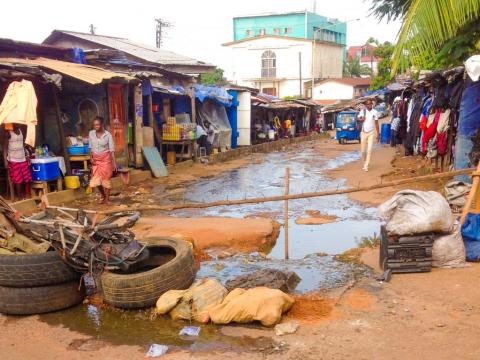By Mabinty M. Kamara
The state of sanitation in Freetown has raised concern among a section of the capital city’s population, amidst dysfunctional sewerage systems that have led to faeces flowing in the streets.
Affected residents have been expressing dissatisfaction over the worsening state of affairs in the last few weeks, with some questioning the commitment and competence of the City Council to tackle the situation.
Several sewers across the central business district have been overflowing for weeks now. In some cases, raw excrements can be seen oozing out and spilling on highways, including on Siaka Stevens Street, the city’s most popular street, named after its first President. The awful situation has caused discomfort for pedestrians, businesspeople and ordinary residents in the affected areas.
An investigation conducted by Politico throughout this week discovered overflown sewers at the Siaka Steven-Charlotte Street junction and between NASSIT building and the iconic Big Market. All these buildings are located near Government Wharf on Wallace John Street, just a few meters away from the Freetown City Council (FCC) offices. There is even one almost directly in front of the Council premises.
The sewage water, which also settled in potholes, causes repugnant order in the whole area. Speeding vehicles sometimes splash the liquid around.
Some of the affected residents who spoke to Politico blamed the Council for what they described as negligence.
Hassan Kamara, a trader around the Big Market area, said he was now worried about the health consequence of the situation due to their exposure to it on a daily basis.
“Even the Mayor has come here and gone but nothing seems to have happened. So we are now fed up. Maybe they want us to die or it’s because they are not directly affected by the stink. That is why we have barricaded the place to stop vehicles from passing here,” he said.
At Hassan’s trading point, raw faeces could be seen flowing down the rugged street leading to the Government Wharf. He and his colleague traders there barricaded the road to prevent vehicles from using it and avoid splashing the offensive liquid on them. They also said they wanted to send a message to officials about the seriousness of the situation.
Much of the area is a working environment, home to major offices like the Western Area branch of the National Social Security and Insurance Trust (NASSIT).
Mariama Kargbo, who sells cooked rice in the same area, lamented that she had already lost customers as a result of the offensive smell in the area.
“Most of my customers have stopped coming here to eat because of this toilet. So I had to reduce the quantity of food I cook. The only reason why I am here is because I have nowhere else to sell,” she said.
Unisa Jalloh, another trader at the Siaka Stevens Street-Charlotte Street junction, is also worried about the health risk of the situation. He is concerned about the unknown implication when the faeces dries up and they inhale the dust generated by passing vehicles.
“I don’t think this thing should have taken this long considering the location and the number of authorities that pass this place. Even the Council is not far from here, but nobody cares,” he lamented.
Politico’s investigation revealed that septic tanks of major buildings in the city center are connected to some of these dysfunctional sewerage systems.
Sanitation in the city is under the purview of the FCC. A Politico reporter approached the Council twice for comment, but they turned us down.
Residents at Wallace Johnson Street said the Mayor, Yvonne Aki-Sawyer, had visited their area and saw the situation first-hand. Hassan, the trader, said they have been enduring the stink for the last seven months.
Another trader, Dauda Bangura said they even visited the Council to report the issue but were told that the waste management group, Masada, was responsible to handle the problem.
Masada has a contract with FCC dealing with sanitation. No official was available to talk when Politico called at their office on Pademba Road.
This week the world marked World Toilet Day. The day is used to promote sanitation across the world. Freetown has always had sanitation problem.
Mayor Aki-Sawyer campaigned on platform of transforming the city to a modern city. She has floated an ambitious master plan which include programmes designed to depopulate the city.
But some of her critics say her ideas are too overambitious and they believe she should focus on key issues like access to clean and safe water and sanitation, which have been twin perennial problems for the city’s residents.
According to a report published in February this year by Water and Sanitation for the Urban Poor, over 90% of the population of Freetown (1.1 million people) rely on on-site sanitation.
“However, only a very small proportion of the fecal sludge collected in pit latrines and septic tanks is disposed of at Kingtom, the official treatment and disposal site. Most fecal sludge is illegally dumped into drains or natural waterways or buried on-site, presenting serious health and environmental risks,” the report read.
The current situation poses risk of infectious diseases outbreak, particularly cholera, which is endemic in the country.
Copyright © 2019 Politico Online









